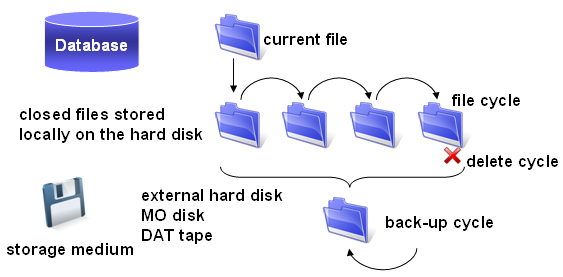Archive/Export Alerts
The data that is collected during operation of WinCC OA is saved in a database or, more precisely, in database files. Due to the limited capacity of the storage medium and the need for data integrity, it is desirable to export these files at specific intervals to another storage medium, for instance to an external hard disk or DAT tape. On the other hand, it is sometimes necessary to import files back into the system from an external database where they were archived. The Archive Control panel allows the:
-
Configuration of the archiving procedure
-
Changing of database files
-
Import and export of database files
-
Deletion (automatic or manual) of database files
The figure below shows schematically the basic archiving sequence using a database file for illustration. Events occurring during operation are saved in the current file for instance. This continues until the database file is changed. This involves closing the current file and creating a new database from an empty database. These are held in the database directory in the empty folder. The file cycle defines the time period after which the database file is changed.

The file cycle chosen depends on the amount of data being collected and the importance of the data. The closed database files are archived on another storage medium according to the storage cycle. Daily or weekly archiving is typical.
Optimization of RAIMA alert overflow database
When an alert or alert update (acknowledgement, alert status change, comment, …) with a time stamp prior to the start of the currently active alert data set is received, the information will be stored in the so-called “Overflow” database.
There is only one overflow database, so when the record limit of this database is reached (16 million records, ~ 5 million alert records), WinCC OA cyclically clears the alert overflow database by moving the inactive alert records into the “correct” alert data sets.
WCCOAtoolRepairDb
Tool for offline repairing the RAIMA-DB (alerts) by checking directories, deleting directories and copying directories. Start the program from the directory <wincc_oa_path>/bin. The following options are available:
| Option | Description |
| -help | Print the following list. |
| -chkafs | Checks for missing alert filesets and corrects DB. |
| -delafs current | Deletes current alert fileset. |
| -delafs living | Deletes living alert fileset (living saves the last alerts of an alerthandling, even the acknowledged). |
| -delafs overflow | Deletes overflow alert fileset. |
| -delafs <dirname> | Deletes the alert fileset specified by <dirname>. |
| -delafs all | Deletes all alert filesets (the entire alert DB). |
Restoring old DB Files
The following procedure helps to restore old database files:
-
Export your data from the old database with the ASCII manager.
-
Create a new database.
-
Start the managers WCCILdata, WCCILevent and WCCILsim.
-
Import the data of the old database with the ASCII Manager to the new database.
-
Check your data points in the PARA module.
-
Stop your projects.
-
Copy the old files of file changes to the directory db/wincc_oa/.
-
Start the program WCCOAtoolRepairDb with the following option:
WCCOAtoolRepairDb.exe -incvfs archivefile
-
This restores the old archive files.
-
Start your project (the Panel Archiv Control) and check with the trend and dpGetPeriod() your history.
| Chapter | Content |
| Archive/export alarms | Introduction and tool for offline repairing the RAIMA-DB, including links to the topics |
| Archive control panel | Description of the configuration panel of alerts |
| Using archive control | Configuration with archive control panel |



